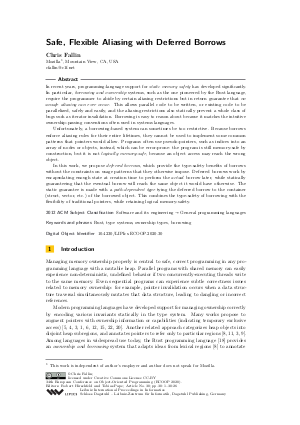Safe, Flexible Aliasing with Deferred Borrows
Author Chris Fallin
-
Part of:
Volume:
34th European Conference on Object-Oriented Programming (ECOOP 2020)
Part of: Series: Leibniz International Proceedings in Informatics (LIPIcs)
Part of: Conference: European Conference on Object-Oriented Programming (ECOOP) - License:
 Creative Commons Attribution 3.0 Unported license
Creative Commons Attribution 3.0 Unported license
- Publication Date: 2020-11-06
File

PDF
LIPIcs.ECOOP.2020.30.pdf
- Filesize: 0.55 MB
- 26 pages
Document Identifiers
Subject Classification
ACM Subject Classification
- Software and its engineering → General programming languages
Keywords
- Rust
- type systems
- ownership types
- borrowing
Metrics
- Access Statistics
-
Total Accesses (updated on a weekly basis)
0Document
0Metadata
Abstract
In recent years, programming-language support for static memory safety has developed significantly. In particular, borrowing and ownership systems, such as the one pioneered by the Rust language, require the programmer to abide by certain aliasing restrictions but in return guarantee that no unsafe aliasing can ever occur. This allows parallel code to be written, or existing code to be parallelized, safely and easily, and the aliasing restrictions also statically prevent a whole class of bugs such as iterator invalidation. Borrowing is easy to reason about because it matches the intuitive ownership-passing conventions often used in systems languages. Unfortunately, a borrowing-based system can sometimes be too restrictive. Because borrows enforce aliasing rules for their entire lifetimes, they cannot be used to implement some common patterns that pointers would allow. Programs often use pseudo-pointers, such as indices into an array of nodes or objects, instead, which can be error-prone: the program is still memory-safe by construction, but it is not logically memory-safe, because an object access may reach the wrong object. In this work, we propose deferred borrows, which provide the type-safety benefits of borrows without the constraints on usage patterns that they otherwise impose. Deferred borrows work by encapsulating enough state at creation time to perform the actual borrow later, while statically guaranteeing that the eventual borrow will reach the same object it would have otherwise. The static guarantee is made with a path-dependent type tying the deferred borrow to the container (struct, vector, etc.) of the borrowed object. This combines the type-safety of borrowing with the flexibility of traditional pointers, while retaining logical memory-safety.
Cite As Get BibTex
Chris Fallin. Safe, Flexible Aliasing with Deferred Borrows. In 34th European Conference on Object-Oriented Programming (ECOOP 2020). Leibniz International Proceedings in Informatics (LIPIcs), Volume 166, pp. 30:1-30:26, Schloss Dagstuhl – Leibniz-Zentrum für Informatik (2020)
https://doi.org/10.4230/LIPIcs.ECOOP.2020.30
BibTex
@InProceedings{fallin:LIPIcs.ECOOP.2020.30,
author = {Fallin, Chris},
title = {{Safe, Flexible Aliasing with Deferred Borrows}},
booktitle = {34th European Conference on Object-Oriented Programming (ECOOP 2020)},
pages = {30:1--30:26},
series = {Leibniz International Proceedings in Informatics (LIPIcs)},
ISBN = {978-3-95977-154-2},
ISSN = {1868-8969},
year = {2020},
volume = {166},
editor = {Hirschfeld, Robert and Pape, Tobias},
publisher = {Schloss Dagstuhl -- Leibniz-Zentrum f{\"u}r Informatik},
address = {Dagstuhl, Germany},
URL = {https://drops.dagstuhl.de/entities/document/10.4230/LIPIcs.ECOOP.2020.30},
URN = {urn:nbn:de:0030-drops-131878},
doi = {10.4230/LIPIcs.ECOOP.2020.30},
annote = {Keywords: Rust, type systems, ownership types, borrowing}
}
Author Details
References
-
J Aldrich and C Chambers. Ownership domains: Separating aliasing policy from mechanism. ECOOP, 2004.

-
N Amin, T Rompf, and M Odersky. Foundations of path-dependent types. OOPSLA, 2014.

-
C Boyapati, A Sălcianu, W Beebee Jr., and M Rinard. Ownership types for safe region-based memory management in real-time Java. PLDI, 2003.

-
D Clarke and S Drossopoulou. Ownership, encapsulation and the disjointness of type and effect. OOPSLA, 2002.

-
D G Clarke, J M Potter, and J Noble. Ownership types for flexible alias protection. OOPSLA, 1998.

-
W Dietl, S Drossopoulou, and P Müller. Generic universe types. ECOOP, 2007.

-
E Ernst. Family polymorphism. ECOOP, 2001.

-
D Grossman, G Morrisett, T Jim, M Hicks, Y Wang, and J Cheney. Region-based memory management in Cyclone. PLDI, 2002.

-
R L Bocchino Jr., V S Adve, D Dig, S V Adve, S Heumann, R Komuravelli, J Overbey, P Simmons, H Sung, and M Vakilian. A type and effect system for Deterministic Parallel Java. OOPSLA, 2009.

-
G. Kastrinis, G. Balatsouras, K. Ferles, N. Prokopaki-Kostopoulou, and Y. Smaragdakis. An efficient data structure for must-alias analysis. CC, 2018.

-
K R M Leino, A Poetzsch-Heffter, and Y Zhou. Using data groups to specify and check side effects. PLDI, 2002.

-
K Naden, R Bocchino, J Aldrich, and K Bierhoff. A type system for borrowing permissions. POPL, 2011.

-
N Nystrom, V Saraswat, J Palsberg, and C Grothoff. Constrained types for object-oriented languages. OOPSLA, 2008.

-
M Odersky, V Cremet, C Röckl, and M Zenger. A nominal theory of objects with dependent types. ECOOP, 2003.

-
J Östlund and T Wrigstad. Multiple aggregate entry points for ownership types. ECOOP, 2012.

-
A Potanin, M Damitio, and J Noble. Are your incoming aliases really necessary? counting the cost of object ownership. ICSE, 2013.

-
A Potanin, J Noble, D Clarke, and R Biddle. Generic ownership for generic java. OOPSLA, 2006.

- Rust community. The Rust programming language. URL: https://www.rust-lang.org/.
- Rust community. Rust survey 2018 results. URL: https://blog.rust-lang.org/2018/11/27/Rust-survey-2018.html.
-
S Stork, K Naden, J Sunshine, M Mohr, A Fonseca, P Marques, and J Aldrich. Aeminium: A permission-based concurrent-by-default programming language approach. ACM Trans. Prog. Lang. Sys., 36, March 2014.

- A Weiss, D Patterson, ND Matsakis, and A Ahmed. Oxide: the essence of Rust, 2019. URL: http://arxiv.org/abs/1903.00982.
-
E Westbrook, J Zhao, Z Budimlić, and V Sarkar. Practical permissions for race-free parallelism. ECOOP, 2012.

-
Hongwei Xi and Frank Pfenning. Dependent types in practical programming. POPL, 1999.

